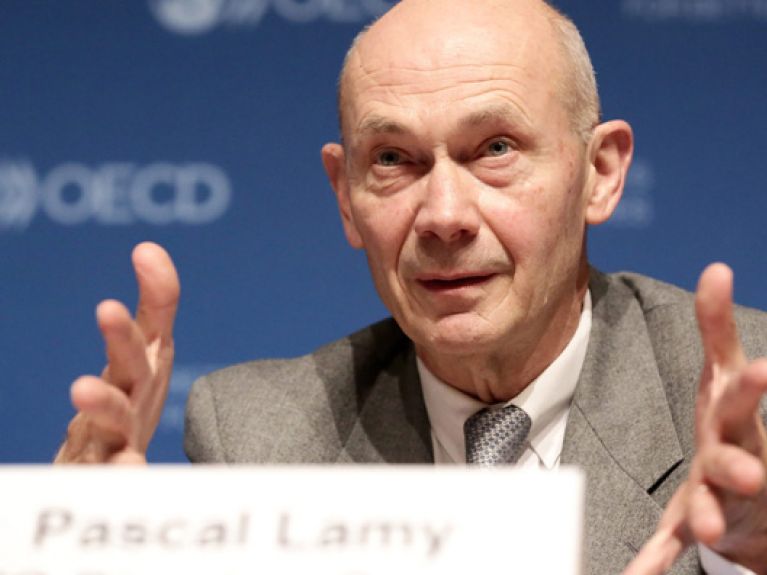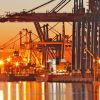DE interview with WTO chief Pascal Lamy
The Director-General of the World Trade Organization (WTO) outlines rules for the future of world trade and explains why flowers from Kenya are more environmentally friendly than flowers from Europe.

MR. LAMY, growth in world trade is currently below the long-term average. What are the reasons for this?
Trade expansion is shaped by several factors. Trade grows mostly in relation to the growth of the overall economy and the overall economy has been sluggish. The World Bank forecasts global growth of only 2.4% for this year, which is only marginally more than the 2.3% expansion in global output in 2012. Europe, which represents the world’s largest market, is contracting and will grow hardly at all this year. The US will grow slightly more, provided they avoid the “sequester” which would radically slash spending and depress growth. Japan is barely growing and even though China, India and Brazil will grow at levels that will make the west envious, this expansion will still be smaller than what they have experienced in recent years. Given this slow growth it’s not surprising that trade volumes grew by only 2.5 % last year and why we expect expansion of but 4.5 % this year.
Where do the problems lie?
Clearly the slowdown in Europe is the biggest drag on economic growth and trade. Europe is the world’s biggest market and when it slows down or contracts the ripple effects resound around the globe. The problems in Europe vary across the continent.
And what role is Germany playing?
German companies are, by and large, highly competitive. The problem for Germany is that exports represent about half of the country’s GDP and about three quarters of these exports go to the EU and the US, where demand for German goods is slowing down. This is a major reason why the German economy contracted in the latter part of 2012 so the answer lies in stoking domestic demand as well as ensuring that the rest of Europe does better. It is in Germany’s fundamental interest.
The Doha Round has failed and the number of bilateral free trade agreements is increasing. Is the WTO allowing the reins to slip from its hands?
While it is true that there are many elements of the Doha round where we are at an impasse, it would not be correct to suggest the round has failed. In 2011 Ministers acknowledged the difficulties we have encountered in the negotiations and set for us the mission of delivering an agreement on those elements of the round where progress could be made. Over the past year or so, progress has been made. In areas like trade facilitation, in which we would like to reduce the administrative thickness of borders by making customs procedures more transparent and uniform, we could reach agreement by our Ministerial Conference in Bali this December. This could be very significant. We could also reach agreement as well on opening more trade in information technology products, expanding the deal we reached in 1997 to encompass more countries and hundreds of new products. It is true that the inability to deliver a wider Doha deal has led some countries to look beyond the multilateral arena and consider regional or bilateral preferential trade agreements. Often the trade impact of such deals is modest because exporters in many countries are wary of the “spaghetti bowl” of different agreements and the high cost of operating in markets with dozens of different rules of origin, tariff structures and customs procedures.
Your successor as European Commissioner for Trade, Karel De Gucht, is pushing for the launch of talks on a free trade agreement with the USA. How do you view this development?
These negotiations have not even started yet and it’s not clear how these negotiations will evolve or what impact any deal that emerges will have on the multilateral process and the WTO. What is clear though is that these will not be easy negotiations. The key issue in transatlantic trade is regulatory convergence and we have all seen how difficult achieving this is. I suspect agriculture will not be easy either. But, for sure, there is a big potential for efficiency gains in these products.
Trade agreements are complex treaties in which all participants have to agree on common standards. What do fair trade rules look like in the 21st century? And why are they so important?
This is a very good question because for the moment we do not have 21st century trade rules. What we have are rules that were agreed 20 years ago. In some ways the basic principles are everlasting – non-discrimination, transparency, predictability, differentiating the commitments countries must take on the basis of their level of development. Today, trade weighted tariffs average only about 5 %. The barriers to trade today and especially tomorrow, are more likely to be non-tariff in nature. Standards, norms, certifications, regulations and customs practices are far more costly and burdensome to companies than tariffs. We are striving to strike a deal on trade facilitation, which would smooth out customs procedures and reduce red tape. This could reduce the cost of customs formalities from 10% of the value of trade to 5 %, saving companies roughly one trillion dollars globally. As trade intersects more and more with other issues, including environment, social standards, product safety, you will see these non-tariff measures become a growing source of friction. I’m quite certain that the US-EU negotiations will illustrate both the opportunities and the challenges of tackling these issues.
The liberalization of trade promises growth and prosperity and is driving globalization. That harms the environment. Calls for localization are becoming increasingly loud. How do you respond to these criticisms?
It is not necessarily the case that more open trade is harmful to the environment. Trade allows you to allocate resources in a more efficient way through the division of labour and comparative advantages. If you have autarky in which every country manufactures everything its citizens consume you have far greater waste, inefficiency and environmental degradation. Remember as well that roughly 90 % of trade takes place via sea vessels, which is the least polluting form of transport. Grass-fed lamb transported to Britain from New Zealand by ship harms the environment less than industrial lamb driven from Scotland to London by truck. Flowers grown naturally in Kenya produce fewer emissions that those grown in greenhouses in Europe. Saudi Arabia is consuming less water by purchasing grains on the international market than by growing it itself. There is nothing wrong with wanting locally produced food or other goods. If this is what consumers prefer, there is clearly nothing in the WTO rules that prevent this. But what if you are a net importing country dependent on food from Australia or Canada? What if you are a conscientious consumer who believes that buying green beans from Tanzania is good for development? We have to be careful that preferences for localization do not become preferences for protectionism. ▪
PASCAL LAMY, WTO DIRECTOR-GENERAL The Frenchman Pascal Lamy (born in 1947) has been Director-General of the World Trade Organization (WTO) in Geneva since 2005. He was European Commissioner for Trade from 1999 to 2004. He will leave office in August 2013.
